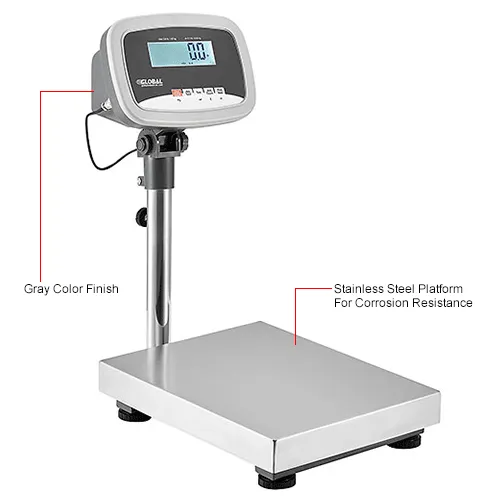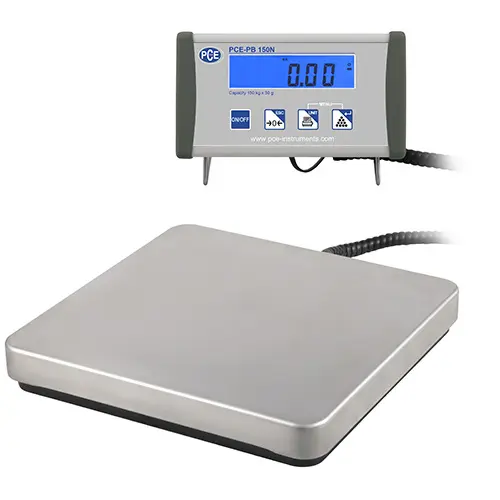Just How Industrial Scales Improve Accuracy in Production and Logistics
By ensuring that products are evaluated accurately, companies can mitigate mistakes that might lead to significant financial effects. The development of sophisticated innovations in weighing systems is changing standard processes.
Relevance of Accuracy in Operations
In the world of manufacturing and logistics, accuracy is the foundation of operational performance. Accurate dimensions are crucial for preserving quality control, maximizing resource allocation, and ensuring conformity with industry criteria. When operations count on precise information, businesses can minimize waste, enhance production timelines, and boost total productivity.
The value of precision expands beyond basic dimension; it likewise affects decision-making processes. As an example, exact weight analyses can figure out appropriate stock degrees, streamline supply chain logistics, and assist in accurate invoicing. In addition, inaccuracies in measurements can result in pricey mistakes, such as overproduction or undervaluing product needs, which can endanger job timelines and productivity.
In addition, precision in procedures fosters a culture of responsibility and high quality guarantee. By carrying out strenuous dimension criteria, companies can recognize inefficiencies and enact improvements, ultimately resulting in enhanced client satisfaction. In an age where competition is intense, the ability to deliver products and solutions with accuracy can be a distinct aspect that establishes a firm apart. Therefore, investing in precision measurement tools, such as commercial scales, is not merely a technological factor to consider yet a strategic important for success in the production and logistics sectors.
Kinds Of Industrial Scales
Different kinds of industrial ranges play a crucial function in achieving the precision necessary for reliable manufacturing and logistics procedures. Each type is made to meet details demands, ensuring precise measurement of products, products, and components.
One common type is the system scale, which supplies a level surface area for weighing bulk materials or big things. An additional type is the bench scale, normally smaller and utilized for considering individual packages or smaller batches of products.
For applications where accuracy is crucial, analytical equilibriums are used. These high-accuracy ranges are made use of in laboratories and research study settings to determine tiny quantities with utmost precision. Floor scales, designed for heavy-duty weighing, are perfect for evaluating big pallets or containers, usually incorporated with forklifts for efficiency.
Furthermore, load cells are utilized in various applications for real-time weight measurement and data collection. Each of these scales contributes distinctively to the operational efficiency, making sure that organizations can keep precision throughout their production and logistics procedures. Recognizing the kinds of commercial scales is necessary for enhancing performance and achieving functional excellence.

Effect on Supply Management
Precise weighing is crucial for reliable supply management, as it directly influences stock accuracy and functional effectiveness. In production and logistics, specific dimension of products and items makes certain that inventory records reflect real stock levels, decreasing inconsistencies that can cause overstocking or stockouts. Industrial ranges give the required precision to evaluate things properly, allowing companies to maintain a trustworthy inventory system.
Furthermore, accurate weighing adds to far better projecting and planning. With specific information on supply levels, organizations can make informed choices pertaining to purchase and production schedules. This decreases the risk of excess supply, which can lock up funding and increase storage prices, along with stop scarcities that might disrupt operations.
In addition, the combination of industrial ranges with supply administration systems assists in real-time tracking of supply activities. hop over to here This enhances the process of updating supply documents, improving openness and responsibility throughout the supply chain. Ultimately, exact evaluating not only sustains effective supply administration however also drives general operational effectiveness, allowing organizations to respond swiftly to market needs and maintain an affordable edge in their respective markets.
Enhancing Quality Control
Efficient inventory administration not just makes sure ideal supply levels however additionally prepares for durable quality control procedures. Industrial ranges play a crucial duty in improving quality assurance by supplying accurate weight dimensions that are crucial for keeping product stability. Regular weight verification allows manufacturers to abide by requirements, guaranteeing that each product fulfills the necessary top quality requirements.
In high-stakes atmospheres, such as food production or pharmaceuticals, also small weight discrepancies can cause substantial compliance problems. By integrating industrial ranges right into the manufacturing line, companies can keep track of product weights in genuine time, enabling prompt corrective actions if problems are spotted. This positive method lessens waste and boosts total item integrity.
In addition, accurate evaluating promotes far better solution of raw products, which is crucial in industries like chemicals and cosmetics. By guaranteeing that component ratios remain consistent, manufacturers can attain premium item top quality, boosting consumer contentment and lowering returns.
Future Patterns in Evaluating Technology
The future of weighing modern technology is positioned for substantial innovations driven by automation, connection, and data analytics. As industries advance, the assimilation of sophisticated sensors and IoT (Internet of Points) capacities will enable real-time surveillance and reporting of weight data. This connection will not only improve operational efficiency yet likewise help with anticipating upkeep, decreasing downtime and improving performance.
Moreover, the unification of expert system and device understanding algorithms right into weighing systems will certainly enhance information evaluation abilities. These modern technologies can identify abnormalities and patterns, enabling even more enlightened decision-making and enhanced supply chain monitoring. Additionally, the increase of cloud-based remedies will allow smooth data sharing across platforms, making certain that stakeholders have access to updated details at all times.
Sustainability will likewise play a vital duty in future weighing innovation. As services make every effort to decrease their carbon impact, weighing systems that incorporate energy-efficient designs and materials will certainly come to be progressively crucial. In addition, click here for more info innovations in electronic considering ranges read review will certainly sustain far better resource administration by offering exact measurements that decrease waste.
Final Thought
Finally, commercial ranges dramatically improve precision in manufacturing and logistics by offering accurate weight measurements important for efficient operations. Their role in inventory monitoring, top quality control, and assimilation with sophisticated innovations underscores their significance in optimizing and decreasing disparities resource allocation. As sectors proceed to progress, the adoption of innovative weighing solutions will certainly additionally support functional effectiveness and decrease waste, inevitably adding to enhanced performance and competitiveness on the market.
One usual kind is the platform range, which supplies a flat surface area for evaluating bulk products or large things. One more kind is the bench scale, usually smaller and made use of for weighing specific packages or smaller sized batches of items. Floor scales, made for durable weighing, are excellent for evaluating huge pallets or containers, commonly integrated with forklifts for effectiveness.
Industrial ranges offer the essential precision to weigh products properly, enabling services to maintain a dependable stock system.
